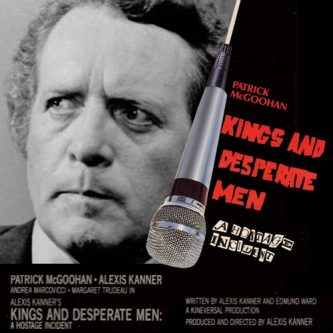 PRISONER fans take note: this 1981 Canadian production reunites the (now deceased) principal actors of that immortal TV series Patrick McGoohan and Alexis Kanner in an arty suspense drama that was co-written, edited, photographed and directed by Mr. Kanner. The film was initially dismissed as an extended ego trip by Kanner (which it essentially is), but KINGS AND DESPERATE MEN is interesting enough to warrant a reappraisal.
PRISONER fans take note: this 1981 Canadian production reunites the (now deceased) principal actors of that immortal TV series Patrick McGoohan and Alexis Kanner in an arty suspense drama that was co-written, edited, photographed and directed by Mr. Kanner. The film was initially dismissed as an extended ego trip by Kanner (which it essentially is), but KINGS AND DESPERATE MEN is interesting enough to warrant a reappraisal.
The film never got much of a release. It was filmed in 1977 but went unseen until four years later, and then briefly made headlines when Alexis Kanner unsuccessfully sued Twentieth Century Fox, claiming the makers of DIE HARD had plagiarized KINGS AND DESPERATE MEN. A 1989 VHS release (to capitalize on the release of Oliver Stone’s TALK RADIO) did little to heighten the film’s profile, which remains obscure.
Full Movie below:
Onto the story, which begins on the night of December 23. John Kingsley (McGoohan), a British radio talk show host working in Canada, is leaving a Christmas party. He discovers an attractive woman in his car, who lures him back to the penthouse suite from which he broadcasts. There he’s confronted by Lucas Miller (Kanner), a history professor and ringleader of a terrorist cell, one of whose members is currently imprisoned.
Miller insists the imprisonment is unjust, and is determined to retry the case on the air. To affect this Kingsley’s wife Elizabeth is taken hostage in their home, as is the judge who put away Miller’s pal. Furthermore, Kingsley’s broadcasting penthouse is laced with explosives.
The following morning Kingsley’s broadcast commences, with a heavy police presence surrounding his penthouse. As Miller steadfastly proclaims his political convictions these two men—and the unnamed woman who set the plot in motion—undergo a very PRISONER-esque face off that only one will survive.
This was the only sole directorial credit by Alexis Kanner (who previously co-directed MAHONEY’S ESTATE in 1972). The production was by all accounts a chaotic free-for-all (according to a recollection by one crewmember, “We were shooting miles of footage, but none of it seemed to come from the script”), which is evident in the choppiness of the finished film, a vastly over-directed hodgepodge with all manner of visual and aural quirks that detract mightily from the suspense.
Ultimately the film works better as a collection of (often quite impressive) parts rather than a unified whole, with some wonderfully oft-kilter editing and camera angles, and a consistently innovative soundtrack. How much of that technical bravura was intentional and how much was utilized to cover up the directorial shortcomings remains an open question.
Yet the film’s raggedness is made to work to its advantage. The frequently garbled and misspoken dialogue helps impart an atmosphere of gritty realism, and the frequent cutaways to the police and citizens of Quebec, CA going about their business outside the main setting (holding up a sandwich in front of a police spotlight in order to see what’s in it, etc.) come to rival the drama inside the recording studio in intensity.
In the lead role Patrick McGoohan has a wonderfully expressive voice and an imposing screen presence, but much of his acting falls flat. That includes a climactic audio soliloquy to his wife, which was evidently supposed to be touching but comes off as merely rambling and incoherent, with the real drama contained in his confrontations with Kanner. Clearly the history these two actors shared on THE PRISONER carried over into KINGS AND DESPERATE MEN, and the film is all the more effective for it.
Vital Statistics
KINGS AND DESPERATE MEN
Kineversal Productions
Director/Producer: Alexis Kanner
Screenplay: Edmund Ward, Alexis Kanner
Cinematography: “Henry Lucas” (Alexis Kanner), Paul Van der Linden
Editing: “Henry Lucas” (Alexis Kanner)
Cast: Patrick McGoohan, Alexis Kanner, Andrea Marcovicci, Margaret Trudeau, Budd Knapp, Neil Vipond, Peter MacNeill, Marcel Beaulieu, Jean-Pierre Brown
